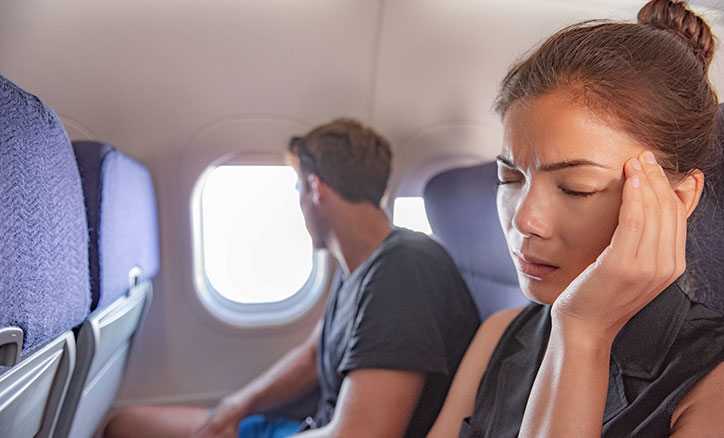Traveling by air can be an exciting experience, but for those who suffer from sinus issues, it can also be quite uncomfortable. Changes in cabin pressure, dry air, and being in close proximity to others can exacerbate sinus problems, leading to pain and discomfort. At Greater Knoxville ENT, we understand the challenges faced by individuals with sinus issues, and we are here to offer some practical tips to help you manage your symptoms during air travel.
1. Stay Hydrated
One of the most important steps you can take to manage sinus issues while flying is to stay hydrated. The air inside an airplane cabin is extremely dry, which can dry out your nasal passages and sinuses, making you more susceptible to discomfort and infections. Make sure to drink plenty of water before and during your flight. Avoid alcohol and caffeine, as these can dehydrate you further.
2. Use a Saline Nasal Spray
A saline nasal spray can be a lifesaver for keeping your nasal passages moist. Use the spray before your flight to maintain moisture in your nasal passages and reduce the risk of irritation. This simple step can make a significant difference in your comfort level.
3. Take a Decongestant
If you are prone to sinus congestion, taking an over-the-counter decongestant before your flight can help. Decongestants work by reducing the swelling of the blood vessels in your nasal passages, making it easier for you to breathe. However, it’s important to consult with your ENT doctor before taking any medication, especially if you have underlying health conditions.
4. Chew Gum or Suck on Candy
Changes in air pressure during takeoff and landing can cause your ears to pop, which can be particularly painful if you have sinus issues. Chewing gum or sucking on candy can help stimulate swallowing, which can equalize the pressure in your ears and provide some relief. Yawning and swallowing frequently can also help.
5. Avoid Dairy Products
Dairy products can increase mucus production, which can exacerbate sinus congestion. It’s a good idea to avoid dairy products before and during your flight to minimize the risk of congestion and discomfort.
6. Practice Good Hygiene
Airplanes are often crowded, and close proximity to others can increase your risk of catching a cold or other respiratory infections, which can worsen sinus problems. Practice good hygiene by washing your hands frequently and using hand sanitizer. Consider bringing disinfectant wipes to clean the surfaces around your seat.
7. Adjust Your Sleeping Position
If you plan to sleep during your flight, try to keep your head elevated. Using a travel pillow can help you maintain a more upright position, which can prevent sinus congestion. If you have a window seat, you can use the window as support for your pillow to keep your head elevated.
8. Use a Humidifier
Portable humidifiers are becoming increasingly popular for air travel. These small devices can add moisture to the dry airplane air, making it more comfortable for your sinuses. Look for a battery-operated or USB-powered humidifier that is easy to carry and use during your flight.
9. Consult with an ENT Specialist
If you have chronic sinus issues, it’s a good idea to consult with an ENT specialist before your trip. They can provide personalized advice and recommend treatments that can help manage your symptoms effectively. In some cases, they may prescribe medication that can provide additional relief.
Air travel doesn’t have to be a dreaded experience for those with sinus issues. By following these tips and taking proactive steps to manage your symptoms, you can make your flight more comfortable and enjoyable. At Greater Knoxville ENT, we are dedicated to helping you achieve optimal sinus health. If you have any concerns or need further assistance, don’t hesitate to contact us for expert advice and care. Request an appointment today. Call (865) 244-4396.
Safe travels!

